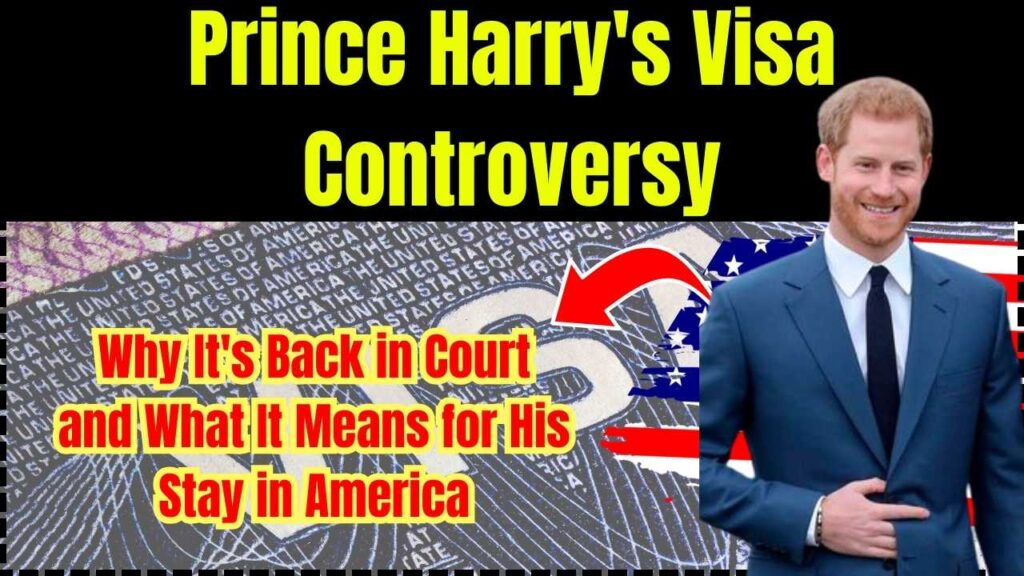
Prince Harry’s Visa Controversy: Prince Harry’s immigration status in the United States has recently come under legal scrutiny, leading to renewed court proceedings. This development stems from questions about the accuracy of his visa application, particularly concerning his past drug use, which he openly discussed in his 2023 memoir, “Spare.” The case has significant implications for both Prince Harry’s residency in the U.S. and broader discussions about the transparency and fairness of the American immigration system.
Prince Harry’s Visa Controversy
The legal scrutiny surrounding Prince Harry’s U.S. visa application underscores the complexities of immigration law and the challenges of balancing individual privacy with public interest. As the case progresses, it will not only impact Prince Harry’s residency in the United States but also contribute to broader discussions about transparency and fairness in the application of immigration policies.
| Issue | Details |
|---|---|
| Legal Challenge | The Heritage Foundation, a conservative think tank, has filed a lawsuit against the U.S. Department of Homeland Security (DHS), seeking the release of Prince Harry’s visa application to determine if he disclosed his past drug use. |
| Court Proceedings | U.S. District Judge Carl Nichols is overseeing the case, which has been reopened after an initial dismissal in September 2024. The judge has expressed a desire to disclose as much information as possible without violating Prince Harry’s privacy. |
| Potential Consequences | If it’s found that Prince Harry misrepresented his drug history on his visa application, he could face legal challenges, including potential deportation. nypost.com |
Background of the Controversy
In his memoir “Spare,” published in 2023, Prince Harry candidly admitted to using various drugs, including cannabis, cocaine, and psychedelic mushrooms. These revelations prompted the Heritage Foundation to question whether he had truthfully disclosed this information on his U.S. visa application, as U.S. immigration law can deem individuals inadmissible for drug use. The Foundation filed a Freedom of Information Act (FOIA) request to obtain his immigration records, which was denied, leading to the current lawsuit against the DHS.
Legal Proceedings and Developments
The case is being heard in the U.S. District Court in Washington, D.C., with Judge Carl Nichols presiding. Initially, in September 2024, the court ruled that Prince Harry’s immigration records should remain private, citing his legitimate privacy interests. However, the Heritage Foundation has successfully petitioned to reopen the case, arguing that there is significant public interest in understanding whether immigration laws were applied fairly in his case.
During recent proceedings, Judge Nichols acknowledged the complexity of the case, balancing privacy concerns with the public’s right to information. He indicated a willingness to release the maximum amount of information possible without infringing on Prince Harry’s privacy rights. The court is currently reviewing declarations from DHS officials to determine the appropriate course of action.
Potential Implications for Prince Harry’s Visa Controversy
If the court orders the release of Prince Harry’s visa records and it is found that he did not fully disclose his past drug use, he could face several consequences:
- Legal Repercussions: Providing false information on a visa application is a serious offense and can lead to visa revocation or denial of entry into the U.S.
- Deportation: Depending on the severity of the misrepresentation, Prince Harry could potentially face deportation proceedings.
- Public and Political Fallout: The case has already attracted significant media attention and could lead to broader discussions about the fairness and transparency of the U.S. immigration system, especially concerning high-profile individuals.
Broader Context and Reactions
The controversy has sparked a range of reactions:
- Political Figures: Former President Donald Trump has publicly stated that Prince Harry should not receive special treatment and that appropriate action should be taken if he lied on his visa application.
- Legal Experts: Some legal analysts argue that the case highlights potential inconsistencies in the application of immigration laws, particularly for high-profile individuals.
- Public Opinion: The case has ignited public debate about privacy rights versus the public’s right to know, especially concerning figures of significant public interest.
USA Visa Guide 2025: How to Check Immigrant or Non-Immigrant Status Online
Visa-Free Travel for US Citizens in 2025 – Visa-Free Destinations Every US Citizen Must Visit
Musk & Trump Move to Shut Down USAID – What It Means for U.S. Foreign Aid!
Frequently Asked Questions (FAQs)
1. Why is Prince Harry’s visa application under scrutiny?
Prince Harry’s visa application is under scrutiny due to his admissions of past drug use in his memoir “Spare.” A conservative think tank, the Heritage Foundation, has questioned whether he disclosed this information on his visa application, as required by U.S. immigration law.
2. What are the potential consequences if Prince Harry did not disclose his drug use?
If it is found that Prince Harry did not disclose his past drug use on his visa application, he could face legal consequences, including the possibility of visa revocation or deportation.
3. What is the Heritage Foundation seeking in this lawsuit?
The Heritage Foundation is seeking the release of Prince Harry’s immigration records to determine whether he was truthful on his visa application and whether he received any special treatment during the application process.
4. How has the court responded to the lawsuit?
The court initially ruled to keep Prince Harry’s immigration records private. However, the case has been reopened, and the presiding judge has indicated a willingness to release as much information as possible without violating privacy rights.
5. What are the broader implications of this case?
This case raises important questions about the transparency and fairness of the U.S. immigration system, especially concerning high-profile individuals. It also highlights the tension between individual privacy rights and the public’s right to information.







